-
"Logging"; Sermon by James T. Crutcher
Reverend James T. Crutcher delievered a sermon on removing the specs from our eyes and becoming a motivation in the world.
-
54th Annual Founders' Day Service
Ambassador John J. Akar from Sierra Leone on "what is the relevance of Black institutions in a land which we like it or not can not chose to led the inevitability of its multiracism?"
-
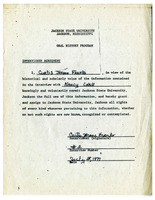 Dynamic Spokewoman for Human Rights Myrlie Evers-Williams
Dynamic Spokewoman for Human Rights Myrlie Evers-Williams Myrlie Evers, later Myrlie Evers-Williams, was a Civil Rights activist and journalist, who served as chairwoman of the NAACP and wrote several books on Civil Rights and her husband Medgar Evers, who was killed in 1963.
-
"Change and Creativity"; Sermon by Orris E. Kelly
Pastor Orris E. Kelly preaches about a person coming to fullness in life from the love that God being to them.
-
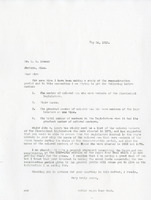 Letter from Dr. Monroe N. Work to Dr. L. K. Atwood
Letter from Dr. Monroe N. Work to Dr. L. K. Atwood A one page letter from Dr. Work to Dr. L. K. Atwood rquesting information pertaining to the colored men who served in the Mississippi legislature during Reconstruction for the 1915-1916 Negro Yearbook.
-
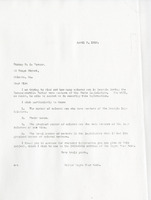 Letter from Dr. Monroe N. Work to Bishop H. M. Neal Turner
Letter from Dr. Monroe N. Work to Bishop H. M. Neal Turner A one page letter from Dr. Work to Bishop Henry McNeal Turner rquesting information pertaining to the colored men who served in the Georgia legislature during Reconstruction.
-
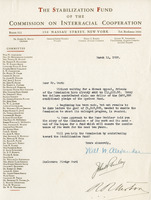 Letter to Monroe N. Work from Will W. Alexander, John H. Finley and Robert R. Moton
Letter to Monroe N. Work from Will W. Alexander, John H. Finley and Robert R. Moton A one page letter asking if Dr. Monroe N. Work will help in contributing to Stabilization Fund of the Comission on Interracial Cooperation.
-
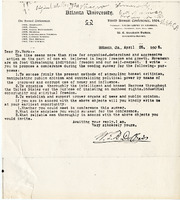 Letter to Monroe N. Work from Dr. W.E.B. DuBois
Letter to Monroe N. Work from Dr. W.E.B. DuBois One-page letter from Dr. W.E.B. DuBois to Monroe Work asking him to attend a conference in the coming summer to discuss methods of uplifting the black community. The Niagara Movement and N.A.A.C.P. are written on top of the letter.
-
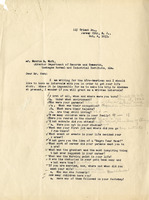 Letter to Monroe N. Work from Anabelle Darden, October 4, 1933
Letter to Monroe N. Work from Anabelle Darden, October 4, 1933 Two-page letter seeking information from Monroe N. Work about his life for inclusion in the New Jersey Afro-American newspaper. More than 20 questions are listed in the letter, some of which have responses next to them written in pencil.
-
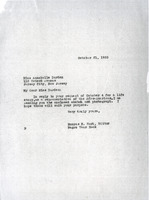 Letter to Anabelle Darden from Monroe N. Work, October 21, 1933
Letter to Anabelle Darden from Monroe N. Work, October 21, 1933 One-page letter responding to Anabelle Darden's request for information about Monroe N. Work to include in the New Jersey Afro-American newspaper. Work included a sketch of his life story and a photograph with his reponse.
-
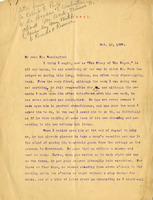 Copy of Letter to Booker T. Washington from Robert E. Park, October 18, 1909
Copy of Letter to Booker T. Washington from Robert E. Park, October 18, 1909 Two-page unsigned letter to Booker T. Washington about Monroe N. Work's help to Robert E. Park during his work on "The Story of the Negro." Park writes about Work's cheerfulness, work ethic, and willingness to help. The letter also mentions a Mr. Scott, Mr. Wood, and Miss Sewall.
-
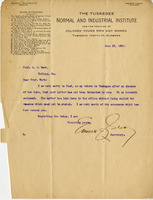 Letter to Monroe N. Work from Emmett Scott, June 25, 1908
Letter to Monroe N. Work from Emmett Scott, June 25, 1908 One-page letter to Monroe N. Work in College, Georgia, from Emmett Scott, a secretary at Tuskegee. Scott's letter references a separate letter for Work that had not been forwarded to him. Scott's letter is typed on Tuskegee Institute stationery.
-
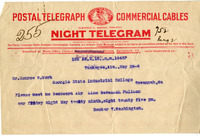 Telegram from Booker T. Washington to Monroe N. Work, May 28, 1908
Telegram from Booker T. Washington to Monroe N. Work, May 28, 1908 A Postal Telegraph night telegram sent to Monroe N. Work at the Georgia State Industrial College in Savannah, Georgia from Tuskegee, Alabama. Booker T. Washington requests Work to meet him at the Seaboard Air Line Savannah Pullman car Friday night, May 29, at 8:25 pm.
-
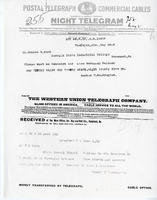 Telegram from Booker T. Washington to Monroe N. Work, June 1, 1908
Telegram from Booker T. Washington to Monroe N. Work, June 1, 1908 A Western Union telegram sent to Monroe N. Work at the State Normal School College in Georgia from Beaufort, South Carolina. Booker T. Washington states that he will be at Tuskegee between June 4th and 7th and hopes that Work can visit then.
-
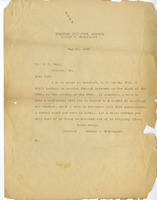 Letter to Monroe N. Work from Booker T. Washington, May 22, 1908
Letter to Monroe N. Work from Booker T. Washington, May 22, 1908 One-page letter requesting that Work meet with Washington about introducing a course at Tuskegee about sociology and history. Washington mentions he will be in Savannah on the 29th or 30th.
-
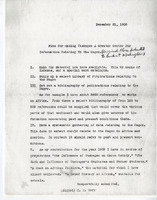 Plan for making Tuskegee a Greater Center for Information Relating to the Negro
Plan for making Tuskegee a Greater Center for Information Relating to the Negro One-page typed document outlining Work's five-step plan, including building a library, releasing a bibliography, and creating a systemic gathering of data. "Original plan submitted to Booker T. Washington," is handwritten on document.
-
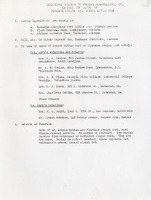 Funeral Arrangements for Florence E. Work and Monroe N. Work
Funeral Arrangements for Florence E. Work and Monroe N. Work Two-pages of directions in case of the death of Florence Evelyn and Monroe Nathan Work. Contains information on the Work family's saving deposits, will, next-of-kin contacts, and details for funeral services.
-
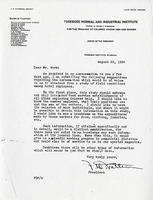 Correspondence between Lawrence A. Oxley, Monroe N. Work, and Frederick D. Patterson, 1935-1936
Correspondence between Lawrence A. Oxley, Monroe N. Work, and Frederick D. Patterson, 1935-1936 Correspondence regarding a "Study of the Trends and Tendencies in the Occupation of Negroes in the United States" by the Personnel Bureau at Tuskegee. Correspondence also refers to the Department of Labor's "National Works Project for Negro White Collar Workers."
-
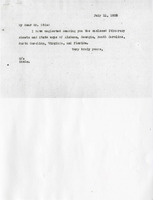 Letters from Monroe N. Work to Otis (Barrett), 1935
Letters from Monroe N. Work to Otis (Barrett), 1935 Four letters from Monroe N. Work to "Mr. Otis" regarding a "study of occupations in the Southern areas" in conjunction with the Agriculture Department. Three letters are dated July 1935, one letter is dated November 1935.
-
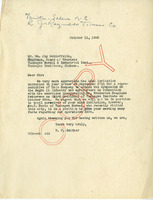 Letter from W. M. Smither to William Jay Schieffelin, October 11, 1935
Letter from W. M. Smither to William Jay Schieffelin, October 11, 1935 Letter from W. M. Smither to William Jay Schieffelin declining an invitation to attend the "Symposium on the Negro" at Tuskegee Institute. "Winston-Salem, N.C., R. J. Reynolds Tobacco Company" is handwritten across the top of the letter.
-
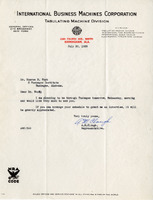 Letter from A. M. Clough to Monroe N. Work, July 30, 1935
Letter from A. M. Clough to Monroe N. Work, July 30, 1935 Letter from A. M. Clough requesting an interview with Monroe N. Work for the following day, Wednesday. Printed on "International Business Machines Corporation, Tabulating Machine Division" stationery.
-
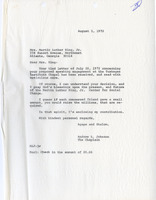 Five Dollar Donation to MLK Jr. Center for Social Change
Five Dollar Donation to MLK Jr. Center for Social Change A letter from Chaplain Johnson to Coretta Scott King wishing her well with fundraising for the MLK Center for Social Justice and a five dollar contribution.
-
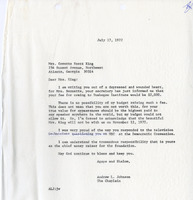 Depressed and Wounded Heart
Depressed and Wounded Heart A letter from Chaplain Johnson to Coretta Scott King explaining that he will not be able to afford her $2,000 fee.
-
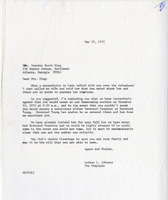 Reverend Fauntroy Replacing Mrs. King as Speaker
Reverend Fauntroy Replacing Mrs. King as Speaker A letter from Chaplain Johnson to Coretta Scott King advising that she is the number one priority to have speak however, if she could not Rev. Fauntroy would be a welcomed second choice.
-
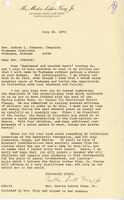 Honorarium Fee Too High
Honorarium Fee Too High A letter from Coretta Scott King to Chaplain Johnson stating that at this time she will not be able to speak at this time due to her trying raise money for the upcoming center.
 Dynamic Spokewoman for Human Rights Myrlie Evers-Williams Myrlie Evers, later Myrlie Evers-Williams, was a Civil Rights activist and journalist, who served as chairwoman of the NAACP and wrote several books on Civil Rights and her husband Medgar Evers, who was killed in 1963.
Dynamic Spokewoman for Human Rights Myrlie Evers-Williams Myrlie Evers, later Myrlie Evers-Williams, was a Civil Rights activist and journalist, who served as chairwoman of the NAACP and wrote several books on Civil Rights and her husband Medgar Evers, who was killed in 1963. Letter from Dr. Monroe N. Work to Dr. L. K. Atwood A one page letter from Dr. Work to Dr. L. K. Atwood rquesting information pertaining to the colored men who served in the Mississippi legislature during Reconstruction for the 1915-1916 Negro Yearbook.
Letter from Dr. Monroe N. Work to Dr. L. K. Atwood A one page letter from Dr. Work to Dr. L. K. Atwood rquesting information pertaining to the colored men who served in the Mississippi legislature during Reconstruction for the 1915-1916 Negro Yearbook. Letter from Dr. Monroe N. Work to Bishop H. M. Neal Turner A one page letter from Dr. Work to Bishop Henry McNeal Turner rquesting information pertaining to the colored men who served in the Georgia legislature during Reconstruction.
Letter from Dr. Monroe N. Work to Bishop H. M. Neal Turner A one page letter from Dr. Work to Bishop Henry McNeal Turner rquesting information pertaining to the colored men who served in the Georgia legislature during Reconstruction. Letter to Monroe N. Work from Will W. Alexander, John H. Finley and Robert R. Moton A one page letter asking if Dr. Monroe N. Work will help in contributing to Stabilization Fund of the Comission on Interracial Cooperation.
Letter to Monroe N. Work from Will W. Alexander, John H. Finley and Robert R. Moton A one page letter asking if Dr. Monroe N. Work will help in contributing to Stabilization Fund of the Comission on Interracial Cooperation. Letter to Monroe N. Work from Dr. W.E.B. DuBois One-page letter from Dr. W.E.B. DuBois to Monroe Work asking him to attend a conference in the coming summer to discuss methods of uplifting the black community. The Niagara Movement and N.A.A.C.P. are written on top of the letter.
Letter to Monroe N. Work from Dr. W.E.B. DuBois One-page letter from Dr. W.E.B. DuBois to Monroe Work asking him to attend a conference in the coming summer to discuss methods of uplifting the black community. The Niagara Movement and N.A.A.C.P. are written on top of the letter. Letter to Monroe N. Work from Anabelle Darden, October 4, 1933 Two-page letter seeking information from Monroe N. Work about his life for inclusion in the New Jersey Afro-American newspaper. More than 20 questions are listed in the letter, some of which have responses next to them written in pencil.
Letter to Monroe N. Work from Anabelle Darden, October 4, 1933 Two-page letter seeking information from Monroe N. Work about his life for inclusion in the New Jersey Afro-American newspaper. More than 20 questions are listed in the letter, some of which have responses next to them written in pencil. Letter to Anabelle Darden from Monroe N. Work, October 21, 1933 One-page letter responding to Anabelle Darden's request for information about Monroe N. Work to include in the New Jersey Afro-American newspaper. Work included a sketch of his life story and a photograph with his reponse.
Letter to Anabelle Darden from Monroe N. Work, October 21, 1933 One-page letter responding to Anabelle Darden's request for information about Monroe N. Work to include in the New Jersey Afro-American newspaper. Work included a sketch of his life story and a photograph with his reponse. Copy of Letter to Booker T. Washington from Robert E. Park, October 18, 1909 Two-page unsigned letter to Booker T. Washington about Monroe N. Work's help to Robert E. Park during his work on "The Story of the Negro." Park writes about Work's cheerfulness, work ethic, and willingness to help. The letter also mentions a Mr. Scott, Mr. Wood, and Miss Sewall.
Copy of Letter to Booker T. Washington from Robert E. Park, October 18, 1909 Two-page unsigned letter to Booker T. Washington about Monroe N. Work's help to Robert E. Park during his work on "The Story of the Negro." Park writes about Work's cheerfulness, work ethic, and willingness to help. The letter also mentions a Mr. Scott, Mr. Wood, and Miss Sewall. Letter to Monroe N. Work from Emmett Scott, June 25, 1908 One-page letter to Monroe N. Work in College, Georgia, from Emmett Scott, a secretary at Tuskegee. Scott's letter references a separate letter for Work that had not been forwarded to him. Scott's letter is typed on Tuskegee Institute stationery.
Letter to Monroe N. Work from Emmett Scott, June 25, 1908 One-page letter to Monroe N. Work in College, Georgia, from Emmett Scott, a secretary at Tuskegee. Scott's letter references a separate letter for Work that had not been forwarded to him. Scott's letter is typed on Tuskegee Institute stationery. Telegram from Booker T. Washington to Monroe N. Work, May 28, 1908 A Postal Telegraph night telegram sent to Monroe N. Work at the Georgia State Industrial College in Savannah, Georgia from Tuskegee, Alabama. Booker T. Washington requests Work to meet him at the Seaboard Air Line Savannah Pullman car Friday night, May 29, at 8:25 pm.
Telegram from Booker T. Washington to Monroe N. Work, May 28, 1908 A Postal Telegraph night telegram sent to Monroe N. Work at the Georgia State Industrial College in Savannah, Georgia from Tuskegee, Alabama. Booker T. Washington requests Work to meet him at the Seaboard Air Line Savannah Pullman car Friday night, May 29, at 8:25 pm. Telegram from Booker T. Washington to Monroe N. Work, June 1, 1908 A Western Union telegram sent to Monroe N. Work at the State Normal School College in Georgia from Beaufort, South Carolina. Booker T. Washington states that he will be at Tuskegee between June 4th and 7th and hopes that Work can visit then.
Telegram from Booker T. Washington to Monroe N. Work, June 1, 1908 A Western Union telegram sent to Monroe N. Work at the State Normal School College in Georgia from Beaufort, South Carolina. Booker T. Washington states that he will be at Tuskegee between June 4th and 7th and hopes that Work can visit then. Letter to Monroe N. Work from Booker T. Washington, May 22, 1908 One-page letter requesting that Work meet with Washington about introducing a course at Tuskegee about sociology and history. Washington mentions he will be in Savannah on the 29th or 30th.
Letter to Monroe N. Work from Booker T. Washington, May 22, 1908 One-page letter requesting that Work meet with Washington about introducing a course at Tuskegee about sociology and history. Washington mentions he will be in Savannah on the 29th or 30th. Plan for making Tuskegee a Greater Center for Information Relating to the Negro One-page typed document outlining Work's five-step plan, including building a library, releasing a bibliography, and creating a systemic gathering of data. "Original plan submitted to Booker T. Washington," is handwritten on document.
Plan for making Tuskegee a Greater Center for Information Relating to the Negro One-page typed document outlining Work's five-step plan, including building a library, releasing a bibliography, and creating a systemic gathering of data. "Original plan submitted to Booker T. Washington," is handwritten on document. Funeral Arrangements for Florence E. Work and Monroe N. Work Two-pages of directions in case of the death of Florence Evelyn and Monroe Nathan Work. Contains information on the Work family's saving deposits, will, next-of-kin contacts, and details for funeral services.
Funeral Arrangements for Florence E. Work and Monroe N. Work Two-pages of directions in case of the death of Florence Evelyn and Monroe Nathan Work. Contains information on the Work family's saving deposits, will, next-of-kin contacts, and details for funeral services. Correspondence between Lawrence A. Oxley, Monroe N. Work, and Frederick D. Patterson, 1935-1936 Correspondence regarding a "Study of the Trends and Tendencies in the Occupation of Negroes in the United States" by the Personnel Bureau at Tuskegee. Correspondence also refers to the Department of Labor's "National Works Project for Negro White Collar Workers."
Correspondence between Lawrence A. Oxley, Monroe N. Work, and Frederick D. Patterson, 1935-1936 Correspondence regarding a "Study of the Trends and Tendencies in the Occupation of Negroes in the United States" by the Personnel Bureau at Tuskegee. Correspondence also refers to the Department of Labor's "National Works Project for Negro White Collar Workers." Letters from Monroe N. Work to Otis (Barrett), 1935 Four letters from Monroe N. Work to "Mr. Otis" regarding a "study of occupations in the Southern areas" in conjunction with the Agriculture Department. Three letters are dated July 1935, one letter is dated November 1935.
Letters from Monroe N. Work to Otis (Barrett), 1935 Four letters from Monroe N. Work to "Mr. Otis" regarding a "study of occupations in the Southern areas" in conjunction with the Agriculture Department. Three letters are dated July 1935, one letter is dated November 1935. Letter from W. M. Smither to William Jay Schieffelin, October 11, 1935 Letter from W. M. Smither to William Jay Schieffelin declining an invitation to attend the "Symposium on the Negro" at Tuskegee Institute. "Winston-Salem, N.C., R. J. Reynolds Tobacco Company" is handwritten across the top of the letter.
Letter from W. M. Smither to William Jay Schieffelin, October 11, 1935 Letter from W. M. Smither to William Jay Schieffelin declining an invitation to attend the "Symposium on the Negro" at Tuskegee Institute. "Winston-Salem, N.C., R. J. Reynolds Tobacco Company" is handwritten across the top of the letter. Letter from A. M. Clough to Monroe N. Work, July 30, 1935 Letter from A. M. Clough requesting an interview with Monroe N. Work for the following day, Wednesday. Printed on "International Business Machines Corporation, Tabulating Machine Division" stationery.
Letter from A. M. Clough to Monroe N. Work, July 30, 1935 Letter from A. M. Clough requesting an interview with Monroe N. Work for the following day, Wednesday. Printed on "International Business Machines Corporation, Tabulating Machine Division" stationery. Five Dollar Donation to MLK Jr. Center for Social Change A letter from Chaplain Johnson to Coretta Scott King wishing her well with fundraising for the MLK Center for Social Justice and a five dollar contribution.
Five Dollar Donation to MLK Jr. Center for Social Change A letter from Chaplain Johnson to Coretta Scott King wishing her well with fundraising for the MLK Center for Social Justice and a five dollar contribution. Depressed and Wounded Heart A letter from Chaplain Johnson to Coretta Scott King explaining that he will not be able to afford her $2,000 fee.
Depressed and Wounded Heart A letter from Chaplain Johnson to Coretta Scott King explaining that he will not be able to afford her $2,000 fee. Reverend Fauntroy Replacing Mrs. King as Speaker A letter from Chaplain Johnson to Coretta Scott King advising that she is the number one priority to have speak however, if she could not Rev. Fauntroy would be a welcomed second choice.
Reverend Fauntroy Replacing Mrs. King as Speaker A letter from Chaplain Johnson to Coretta Scott King advising that she is the number one priority to have speak however, if she could not Rev. Fauntroy would be a welcomed second choice. Honorarium Fee Too High A letter from Coretta Scott King to Chaplain Johnson stating that at this time she will not be able to speak at this time due to her trying raise money for the upcoming center.
Honorarium Fee Too High A letter from Coretta Scott King to Chaplain Johnson stating that at this time she will not be able to speak at this time due to her trying raise money for the upcoming center.